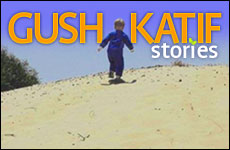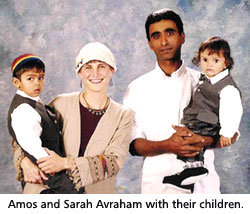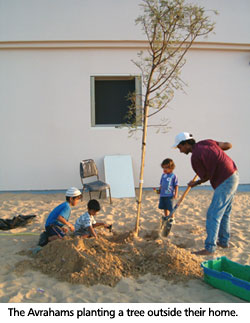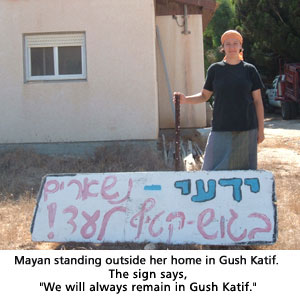 Iran’s Attack on Israel
Iran’s Attack on Israel


4 min read
3 min read
7 min read
16 min read
As the disengagement looms, a glimpse into the hearts of the residents.
First in a 3-part series.
This 3-part series presents personal profiles of Jewish residents of Gush Katif, portaying the human dimension behind the politics.
1. Amos's Story
Amos Avraham was born into the Zionist dream. His parents were Indian Jews, descendents of Israelite traders who voyaged to South India during the reign of King Solomon. For thousands of years they had prayed to return to Zion; as soon as the State of Israel was established, Amos's parents -- and virtually their whole community -- picked up and went. "Why did we come?" reminisces Amos's mother. "For love of the Land of Israel."
Amos's father started a farm in the middle of the desert, in Moshav Nevatim. He planted fields of artichokes and orchards of apricots. Amos, eager to follow in his father's footsteps, attended a high school specializing in agriculture. After three years' of service in the Israeli army as a paratrooper, Amos and two friends, keen to work the land, moved to a kibbutz.
Tilling the soil, however, was only half of Amos's dream. He longed to start something new, to reclaim desolate land, to make the desert bloom. In 1992, Amos and his friends approached the Israeli government with their vision. The government sent them to the barren sand dunes of Gush Katif.
Amos and his friends established their farms. Although the local Arabs had scorned the area as the "cursed land of El G'erara," because, with miniscule rainfall, nothing would grow in the infertile sand, the Jewish settlers pioneered new methods. They built hothouses to withstand the winter cold and innovated the "drip irrigation system" now used worldwide. Today Amos owns 20 dunams (about 5 acres) of hothouses in which he grows organic cucumbers and red peppers for export, as well as tomatoes for the Israeli market.
 In 1997, Amos married Sarah Jaffe, who, with her mother and podiatrist father, had made aliyah from California. That same year, the three friends' farms became the official settlement of Tel Katifa.
In 1997, Amos married Sarah Jaffe, who, with her mother and podiatrist father, had made aliyah from California. That same year, the three friends' farms became the official settlement of Tel Katifa.
At first, it was difficult to attract more residents. Life was hard. The farmers lived in trailers. There was no electricity except for a generator that worked part of the day; gasoline was too expensive to keep it running fulltime. The water pressure was so low that when the watering system was on in the hothouses, the homes were without water.
Today Tel Katifa comprises 24 families, including Ethiopian and Russian immigrants, religious and secular Jews, Ashkenazim and Sephardim. They live together in peaceful harmony, which, while it eludes the rest of Israeli society, seems to be the motif of Gush Katif. Despite the looming expulsion, at the end of June two new families moved into Tel Katifa.
After six years living in a trailer and the birth of three children, Amos and Sarah started to build their dream house. The house was half-built when the government announced the unilateral withdrawal from Gaza. "What could we do?" Sarah asks with a shrug. "We finished the house."
Ten months ago they moved in. The house is airy and spacious, with white walls accented with brick corners, high ceilings, stone tiled floors, and many large windows looking out at the beloved landscape of sand dunes and hothouses. A large framed photograph in the dining area portrays their favorite scenery: Amos's hothouses.
Amos is a man of a few words. When he does speak, he talks so softly that his listener must bend forward to hear. He believes that the work of his hands, growing live food out of arid sand, is his real statement.
Sarah, 28, is wearing a long skirt and an orange T-shirt, the official color of the struggle for Gush Katif. She does not raise her voice even amid the commotion of a half dozen neighborhood children playing in her living room.
 Sarah points out her living room window at a sprawl of Arab houses and remarks, "When I came here eight years ago, you couldn't see a single house or building from here. It's not like we came and took their land. There was nothing here. Now the suburbs of Dir El Balach are expanding toward us.
Sarah points out her living room window at a sprawl of Arab houses and remarks, "When I came here eight years ago, you couldn't see a single house or building from here. It's not like we came and took their land. There was nothing here. Now the suburbs of Dir El Balach are expanding toward us.
"Amos has about ten Arab workers. They're upset at the prospect of our leaving. They say to Amos, 'Take us with you. We want to go with you wherever you go.' The Palestinian police - now they don't come in here any more [since the collapse of Oslo] - but they used to drive around here and beat up our Arab workers and exhort money from them. The workers are scared of what will happen to them if we leave."
Just last week Condoleezza Rice announced that the houses of Gush Katif will be destroyed. This includes the Avraham's glistening new four-bedroom house. How does Sarah feel about the prospect of her dream house being bulldozed? The soft-spoken Sarah answers without rancor, "I'd rather destroy it than have terrorists live in my house."
The Avrahams have made no actual preparations for leaving. "You can't work against it and plan for it at the same time."
She adds as an afterthought: "Besides, the farm is worth much, much more than the house. My husband worked 13 years to build up his farm. He won't get any meaningful compensation for it. Amos is only 37 years old. He's young enough to start over. But there're a lot of older people in Gush Katif. They're the ones who are most worried. How will people in their fifties start over again?"
I ask her what she thinks of her fellow Israelis, some 53% of whom (according to the latest polls) support the disengagement. "Anyone who supports the expulsion doesn't understand what it's about," she says in a baffled tone. "It would be different if it were some kind of mutual exchange. But unilateral withdrawal? It's just giving the Palestinians a present."
What will they do when the army comes to take them away?
"Well we certainly aren't going to willingly get on the bus. I guess they'll have to carry us away."
She pauses, then adds: "Amos was called up for reserve duty this summer. His unit is supposed to train for the evacuation. He called the army and asked, 'Do you expect me to evacuate my wife and children?' Two weeks later he got a letter canceling his reserve duty.
"You know," she continues, "many of the soldiers stationed here are very upset. They have a real bond with the community. They're invited for Shabbat dinner whenever they're off duty. The teenagers of Gush Katif built a kind of clubhouse for the soldiers. We keep it stocked with homemade cakes and drinks. The soldiers leave letters there thanking the people. They write: 'Don't let them take you away. Be strong. We're with you.'"
The Avrahams have made no actual preparations for leaving. "You can't work against it and plan for it at the same time," Sarah declares. "That would be a contradiction."
And how is she working against it?
"Through spiritual resistance. All the women say Tehillim [Psalms] every day. About once a month we have a mass prayer rally of the whole Gush. Rabbis, both from here and from all over Israel, come and teach classes about faith and about the history of the Jewish people. We've experienced so many worse decrees. Look at Purim. There was a royal decree to kill every Jewish man, woman, and child. Who would have believed that the whole plan would be overturned in a single day?"
2. MAYAN'S STORY
 Mayan was born far from the Zionist dream, into a Catholic family in Yugoslavia. Until the age of ten, her childhood was one of peace and affluence, ski trips and boating vacations. Then her father died. Two years later, war broke out. "This war turned me, suddenly, into a 'Croatian,' the evil enemy of my best friends, who, I now discovered, were 'Serbians.'"
Mayan was born far from the Zionist dream, into a Catholic family in Yugoslavia. Until the age of ten, her childhood was one of peace and affluence, ski trips and boating vacations. Then her father died. Two years later, war broke out. "This war turned me, suddenly, into a 'Croatian,' the evil enemy of my best friends, who, I now discovered, were 'Serbians.'"
Caught during the war in a Serbian-occupied area, Mayan, her mother, and her sister endured five years of hunger, cold, and the deaths of their friends. They struggled to survive, motivated by their "firm belief in Croatian unity and nationalism" and their hopes to rejoin their own people. Finally, through hard work, they managed to buy passports to escape to the Croatian side of the border.
They were greeted by nothing. "When we reached our 'promised land,' nobody there cared; there was no support and no help for us." Seventeen-year-old Mayan felt betrayed by her own people. "Everything in my life was unreliable and false. I felt a compulsion that I must start my life all over again from the very beginning."
Whenever Eyal met a fellow Jew, they called each other "brother" and would look out for each other's needs. Mayan had never before witnessed such mutual caring.
A few years later, she took a job as a waitress on a ship. There she met Eyal Yadai, the ship's Israeli security officer. She noticed that whenever Eyal met a fellow Jew, they called each other, "brother," and would look out for each other's needs, "like he had a responsibility for the other Jew."
Mayan had never before witnessed such mutual caring. She decided to accompany Eyal back to Israel. When he told her that he would not marry her unless she converted, she decided to learn about Judaism. "I gladly began to learn the details of this new way of life that I had yearned for, the life of a nation where all really care about each other with devotion."
Several months later, as her conversion neared, Mayan told Eyal that she would marry only a man who was religious. So Eyal, too, began studying Judaism. They finally married as two observant Jews.
In 2003, they moved to the settlement of Netzer Hazani in Gush Katif. That very day, Eyal had to report for his month-long reserve duty. Mayan was left alone in their tiny, rented house with their one-year-old daughter. She was a 26-year-old foreigner, pregnant, and knew no one in Netzer Hazani. Suddenly there was a knock on the door. She opened it to find a smiling neighbor with a loaf of fresh bread. Soon, another knock. Another neighbor had come with a home-cooked meal. Then another knock: a neighbor was inviting her for Shabbat dinner. "I was never left alone for the entire month."
Mayan was overwhelmed by her welcome. It was the actualization of what she had glimpsed on the ship. In the words of the Mishna that Mayan loves to quote: "All Jews are responsible one for the other."
TEST OF FIRE
Three months later their test of fire came. As Eyal, Mayan, and their daughter Avia were driving out of Gush Katif, they suddenly saw two Arabs with automatic rifles on the road in front of them running straight toward their car. The Arabs started shooting at them. Eyal floored the accelerator. Five bullets penetrated the Yadais' car. "Each bullet," asserts Mayan, "was a personal miracle to each member of my family, missing each of us by millimeters."
They made it to the Israeli army outpost at the Kesufim Crossing, a few hundred meters away. The gunfire continued, as soldiers from the outpost raced to the scene. The terrorists managed to kill Tali Hatuel, eight months pregnant, who was driving the car behind the Yadais. When the Hatuel car stopped, the terrorists approached it and fired close-range at Tali's four young daughters, murdering all of them including the toddler strapped into her car seat.
The Yadais were still at the outpost, trembling from their near-miss, when one of the soldiers returned, weeping. "I killed one of the terrorists," he sobbed, "but I was two minutes too late to save the children."
They had been on their way elsewhere, but Eyal and Mayan, in their bullet-riddled car, drove directly to the Kotel (the Western Wall) in Jerusalem, to thank God for their lives.
In the wake of the terror attack, the residents of Netzer Hazani told the Yadais that they'd understand if they left Gush Katif. They knew it was not easy to live like this. Mayan replied, "What? With wonderful neighbors like you, I can be strong and I can stay here forever. Especially now, leaving is not an option." The community supported them. "For one month after the attack, we did not eat one meal alone. Our fellow Jews came to be with us."
"He has not spent one night alone in this last year." According to Mayan, such support is "standard procedure" in Gush Katif.
As for Tali Hatuel's husband David, the sole survivor of his family's massacre (he was at his job as a school principal at the time), he continues to stay in the Gush Katif house that was once alive with the sounds of his four children. "He has not spent one night alone in this last year," Mayan tells me. "Every night fellows from the community go and stay with him."
According to Mayan, such support is "standard procedure" in Gush Katif. "If somebody leaves the country for work or any reason, his wife or his children are never left alone. Here everybody takes care of everybody." Mayan speaks in an earnest, heavily-accented English. "And it's not only in Gush Katif. It's like this all over Israel. I've never seen such a mutual commitment, one to the other. You can really feel this here.
"We help Arabs. How not to help Jews? A few days ago there was a rocket attack nearby, in the settlement of Ganei Tal. A rocket fell on the hothouses where Arab workers were. The Arabs were badly wounded. They got the same treatment as any Israeli would get. Straight away we heard helicopters in the air, removing the injured Arabs to the hospital. Of course we helped them, because they needed help. If we help Arabs, how will we not help each other?
"This is the Jewish people - compassionate, generous, and caring.
"To tell you how much people are united here - in Netzer Hazani there is one synagogue where everyone prays together - Sephardim, Ashkenazim, Morrocans, Yemenites. Here you can find Jews from every nation, and no one looks down on anyone. You can see how they pray together - no arguing, never, never. There's real harmony here."
Only one of the 21 Gush Katif communities has signed up to relocate elsewhere as a unit. The people of Netzer Hazani will likely have to split up, each going to a different destination.
"I will go with these people to the ends of the earth," Mayan declares. "The people here are so amazing, so soft, so nice. Now they have become fighters because they don't have a choice, but that's not their nature. I look at the way they raise their children, and that's the way I want to raise my children. I pray with all my heart that I'll stay here for many years to come."
Mayan says that a visit to Gush Katif causes many to change their minds about the Disengagement.
"People start to see more than what they see in the news. They start to come here and see for themselves. Every day at least ten busloads come to Netzer Hazani, from all over the country, from all over the world. Today I spoke to two busloads of American Jews, but they're also coming from Germany, from Italy, but mostly Israelis. They come to see the last glimpse of Gush Katif before they give it away. They don't even know where is Gush Katif. In the beginning they come to Netzer Hazani, where 70 families live, and they think that this is all there is of Gush Katif. I tell them, 'This is only one of 21 villages here.' They don't believe me. At the end of the tour, everyone cries, because they finally understand what they missed when they trusted the news. I have not met one person who didn't change his mind after seeing Gush Katif. Only when you see this beautiful, blossoming, flourishing place can you understand.
"They see that we are normal people, that we don't have vampire teeth, that we have normal homes and normal kids and normal education, that we don't teach our kids to hate. They don't even know that we live in normal houses. They think we live in trailers; they expect to see me, a mother carrying a gun, with dirty, sandy children beside me. Once two people from the government came. At 2:00 in the afternoon, they said, 'It's getting late. Let's go to Gush Katif.' I said, 'This is Gush Katif.' They couldn't believe me."
What plans has Mayan made for the Disengagement?
"I don't think about the day of the expulsion. I don't even know the date. I live in a rented house, so I'll get nothing. And I don't want anything. But if it happens, I have nowhere to go. The only place I can go is the Kotel. And there you'll find me. It's my second home. If God doesn't want me here, I'll be there, in His home. And that, too, will be for the best. But, until the end, I'm going to fight."
How does this young mother fight?
"I use the explanation of my life to make people understand better how important the Land of Israel is, and how important it is to me. Today I have a stable home, and I don't want to lose it. And prayer is the strongest weapon. If God heard the prayer of a young girl in a small Croatian town, then He will certainly listen to the prayers of His People living in their homeland."
In the comments section below, Aish.com encourages readers to share your views of the Disengagement.
Support for Needy People of Gush Katif:
1. Avital and Natan Sharansky have started a short term emergency fund for families who have been evacuated from Gush Katif. They are evaluating each case carefully and would like to have funds available in an account so that they can give funds to these people who are currently in crisis as soon as possible to help them with their immediate needs. Thus far they have helped families having weddings in the coming weeks and several other short term emergency needs. There are many families with serious needs.
Checks can be made out to Avital Sharansky and mailed to:
Avital and Natan Sharansky
c/o Richard Kovler
Rechov Mishmar Ha'am 1/4
Jerusalem 93226
Israel
Questions or further information can be obtained from Richard Kovler who works closely with the Sharanskys at richkov@netvision.net.il
2. An organization called Lemaan Achai -Emergency Campaign for Gush Katif- is trying to be the coordinating body of all those interested in helping. One can call 1-700-501-300 to donate items, services or to volunteer one's time. People willing to donate funds are being asked to call 1-800-351-012 and to specify that the money is for Keren Lemaan Achai. Israeli tax deductible receipts will be issued through an organization called Paamonim.
3. United States donors of funds can give money with US tax deductible receipts through All4israel via their website www.All4israel.org or by contacting Zalman@all4israel.org.
